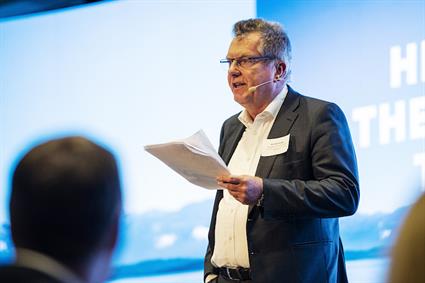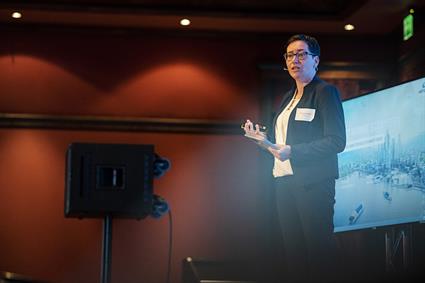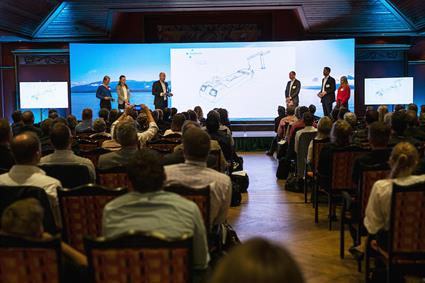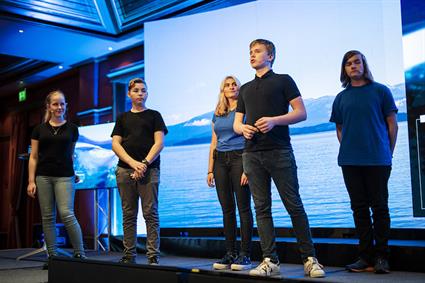

The Horizons series forms part of Wärtsilä’s Ocean Awakening vision to collectively address the serious challenges facing the maritime industry. The goal is to bridge the gap between the present day and a sustainable future. Attendees work together to co-create tangible solutions to transform the industry and secure a desirable future.
“Collaboration and innovation are exciting and challenging. If you want a sustainable future for transportation at sea, it is highly necessary,” said Cato Esperø, Sales Director, Wärtsilä Norway at the most recent Horizons event held in Oslo in June 2019. “We cannot predict the future, but we are sure the production and distribution of clean energy are vital to develop sustainable communities.”

Bill Hemmings, Director, Aviation and Shipping at the NGO Transport and Environment.
The clock is ticking
After successful events in Helsinki and Trieste, the latest Horizons event drew together executives, academics, policymakers and figures from civil society to create new solutions for clean shipping.
Bill Hemmings, Director, Aviation and Shipping at the NGO Transport and Environment, gave the keynote address at the event. Hemmings said CO2 emissions from shipping must be cut dramatically and that governments must mandate speed restrictions and a progressive switch to zero-emission fuels, starting in Europe.
Tamara de Gruyter, Wärtsilä’s Vice President, Marine Business, Area Europe & Africa, explained that innovation and co-creation are essential in meeting this challenge. And while the industry has made great progress, it is essential to speed up the pace of collaborative innovation.
“We’re running out of time,” de Gruyter said.

Tamara de Gruyter, Wärtsilä’s Vice President, Marine Business, Area Europe & Africa.
Concrete benefits of collaboration
De Gruyter highlighted Wärtsilä's Smart Technology Hub in Vaasa, the IntelliTug autonomous tug project together with Singaporean partners, the SEA20 initiative for 20 maritime cities and ZEEDS as good examples of the type of collaborative initiatives that will be required.
ZEEDS (Zero Emission Energy Distribution at Sea) is a concept to revolutionise bunkering logistics in Northern Europe. Main partners Wärtsilä, Kvaerner, Equinor Aker Solutions, DFDS and Grieg Star envisage an ecosystem of strategically located offshore clean fuel production and distribution hubs. Wind will provide the power to create green ammonia while refuelling will be completed ship-to-ship.
“I like the idea of opening up the project,” said Jenny Braat of the Danish Maritime cluster. “I’ll certainly bring an invitation home. Especially in the north of Europe, it is better we work together than alone. We need to be in the front seat.”

ZEEDS (Zero Emission Energy Distribution at Sea) is a concept to revolutionise bunkering logistics in Northern Europe.
Finding the right solutions for different challenges
Two panel discussions deftly moderated by TradeWinds editor-in-chief Julian Bray debated how collaboration can disrupt the marine infrastructure and ecosystem, and what a green energy distribution infrastructure for future shipping might look like. The ZEEDS consortium fit both these topics: it is a collaborative effort to remake the marine infrastructure.
Future shipping is currently following two different paths depending on if the vessels make shorter journeys – such as ferries – or longer trips like global container carriers. Short sea journeys are increasingly turning to hybrid and battery power. Norway, in particular, has been a forerunner: they have a zero-emission target by 2026 for the west coast fjords and are on the market for 20 new high-speed ferries, many of which might be hybrid or battery-driven. For the longer journeys of deep-sea vessels, green ammonia and other synthetic fuels are looking promising. The ZEEDS decision to focus on ammonia was met by approval by the experts on the panel discussions.
The role of governments was also a major topic of discussion. Governments set the regulations, but they are also entwined with the maritime sector when it comes to green innovations. Many governments have financing mechanisms which encourage private investment into cleaner technologies and solutions.

Young Techno.
Building a smarter marine ecosystem, together
Millennials were also in attendance at the Horizons event in Oslo to showcase some of their ideas. The group, Young Techno, pitched their idea to create a green shipping line between Norway and the UK, featuring an underwater submarine/rail hybrid vehicle for freight and passengers. Also, in the audience was 12-year old Amara A., a student at the French Lycee in Oslo, who has an interest in shipping well beyond her years. She frequently posts about maritime issues on Instagram, which caught the attention of the industry.
The attendees split into seven different workshops to co-create solutions for pressing maritime challenges. After the workshop’s participants gave a two-minute pitch for the ideas they developed. The themes included: Smart marine solutions in port cities, Clean offshore energy, Energy efficiency in future vessels, Accelerating the uptake of renewable fuels, Profitable green shipping, Consumer behaviour’s influence on shipping and Sustainable seafood.
“This is why we invite important stakeholders to the Future Innovation Day – Horizons,” said Jane Jünger, Communications and Marketing Manager, Wärtsilä Norway. “Together we will explore new solutions for a smarter marine ecosystem. We need smart technology that reduces emissions and enables efficient usage of clean energy.”
“We're really pleased,” said Hans-Petter Nesse, Managing Director of Wärtsilä Norway. “We've had some great insights, and it's fantastic what the workshops generated. All ideas were welcome, and thanks to all who took part. We've got to think big to reduce our carbon footprint and we can only accelerate change through a combined effort.”
